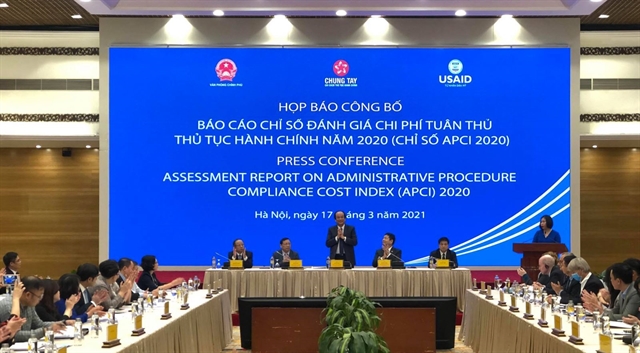 Society
Society


|
| Mai Tiến Dũng, Minister and Chairman of the Government Office chairs the press conference to release a report on 2020 Administrative Procedure Cost Index on Wednesday in Hà Nội.— VNA/VNS Photo Viết Tôn |
HÀ NỘI — Tax procedures improved the most among nine groups of key administrative procedures enterprises face, the 2020 Administrative Procedure Cost Index (APCI) has revealed.
The index showed that tax procedures improved by 5.6 points.
On average, a business had to pay VNĐ11,600 (US$0.49) and took 3.8 hours to implement tax administrative procedures, the report said.
The report, which looks into the time and money businesses spend on administrative procedures, was released yesterday morning by the Prime Minister's Advisory Council for Administrative Procedure Reform.
It surveyed nearly 3,000 enterprises that conducted administrative procedures in the second half of 2019 in 63 provinces and cities nationwide.
The report reveals the financial burden that the nine groups of important administrative procedures place on enterprises.
They consist of investment; cross-border commercial transactions; business registration at early start; environment; business licence and work permit; land; construction; tax; and specialised inspection.
Per the report, a business only took 0.9 hours (54 minutes) – the shortest time among 63 provinces and cities in the country, to implement tax administrative procedures in Thái Bình Province.
The report also said a business spent only 1.9 hours on tax administrative procedures in the northern key economic region – the shortest time among three key economic regions in the country while the number is up to 9.5 hours in the Mekong Delta key economic region.
The improvement level in tax procedures was thanks to a large reduction in time and costs to carry out the procedures. Specifically, the processing time was reduced by 19 per cent and the cost fell by up to 79 per cent compared to 2019.
The success came through applying information and technology to handle tax administrative procedures in the digital environment and the change of the State management method from checking imported goods before customs clearance to checking imported goods after customs clearance.
Additionally, the report said specialised inspection administrative procedures ranked second with the overall level of improvement increasing 5 points compared to 2019.
Next, the group of environmental administrative procedures ranked third, with the overall improvement increasing by 0.5 points compared to 2019.
Ranked fourth was the group of administrative procedures related to business registration, with an overall improvement of 0.2 points.
Four lessons
Speaking at the press conference, Mai Tiến Dũng, Minister and Chairman of the Government Office, pointed out four lessons from the report.
The first lesson was that the top priority task of the Government, ministries, sectors and localities was to apply information and technology to handle administrative procedures in the digital environment to save costs for businesses, he said.
The second lesson was Việt Nam needed to continue reducing administrative procedure compliance costs, including both official and informal costs, to create a transparent and healthy business environment, he said.
A transparent and healthy business environment would offer opportunities for businesses to participate in regional and global value chains, he added.
The third lesson was that changing from pre-check to post-check for imported goods was the right move, he said.
The conversion was not simply a change of conditions and requirements for enterprises, but also the complete change of State-management method for each sector as well as changing enterprises' awareness of their responsibilities, he said.
Lastly, the fourth lesson was the 2020 APCI reflected that a people-and-business centred administration would save costs for all of society, he added.
Cutting the costs to comply with administrative procedures depended not only on institutional and infrastructure factors but also on the people who carry out the procedures, he said.
To do that, officials and staff’s attitudes and responsibilities towards their jobs must change to an attitude of serving the people, he said. — VNS




